Episode 32: FOOTPRINT+ Special 1 With Interviews From The Event
- Jackie De Burca
- June 14, 2022
FOOTPRINT+ Special 1 With Interviews From The Event
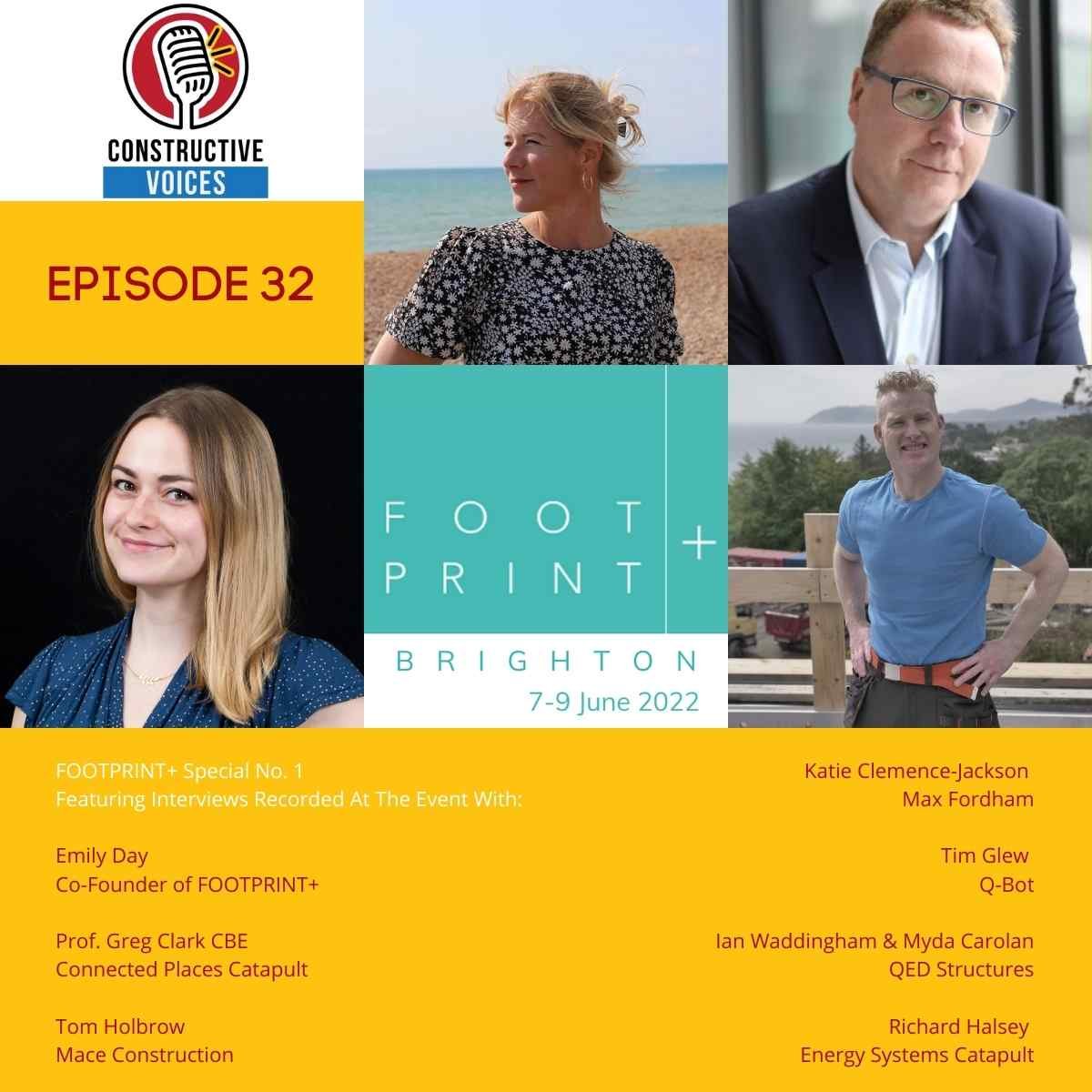
Pete the Builder and Steve Randall make you feel like you are at FOOTPRINT+ yourself!
This first FOOTPRINT+ Special kicks off with an insightful catch-up interview with Emily Day, the Co-Founder of Footprint+. Speaking to Pete, Emily, who believes that through connections people can learn from each other and come up with new ideas, talks about how she feels about the first ever FOOTPRINT+
 Emily Day is co-founder and director at Footprint+, she is an award-winning architect and urban designer with a particular focus on global development and social responsibility. As founder of Footprint+, she has taken the opportunity to redeploy her knowledge to make a positive social contribution, helping all parties make progress towards a Carbon Zero future.
Emily Day is co-founder and director at Footprint+, she is an award-winning architect and urban designer with a particular focus on global development and social responsibility. As founder of Footprint+, she has taken the opportunity to redeploy her knowledge to make a positive social contribution, helping all parties make progress towards a Carbon Zero future.
Qualified as a chartered architect , Emily has over 20 years of experience working on large-scale projects. She has worked with many key players within the industry; local authorities, developers, and financial institutions which have given her a unique insight into the needs of the different parties
Here are some of the questions we Pete asked Emily:
Do you think the Footprint Plus+ event went well? Do you wonder what the founders of the event think about the state of the industry and prospects for the future? If so, you will enjoy this interview with one of the founders of Footprint+.
“The event itself is intended to bring people together, to share knowledge and through this knowledge sharing able to approach projects with new initiatives”
“It’s a slow changing industry, it’s not going to change overnight but I can really see the opportunities are there”
Steve Randall spoke to Prof. Greg Clark about the role of cities in our quest towards NetZero.
Prof. Greg Clark is Chair of the Connected Places Catapult and UK Cities Climate Investment Commission
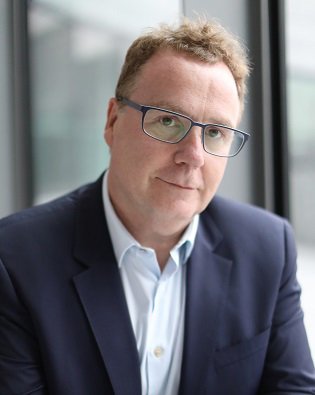 Prof. Clark was a keynote speaker at the event. His talk was entitled, The Urban Transition. There is no net zero transition without an urban transition, and that urban transition requires a new partnership between cities, property and investors. Post pandemic we face stark choices and immense opportunities to remake our cities in support of our planet. That requires good urbanisation. What does it look like?
Prof. Clark was a keynote speaker at the event. His talk was entitled, The Urban Transition. There is no net zero transition without an urban transition, and that urban transition requires a new partnership between cities, property and investors. Post pandemic we face stark choices and immense opportunities to remake our cities in support of our planet. That requires good urbanisation. What does it look like?
Greg is a world expert on cities, urban investment, and sustainable urban transition. Over a career of 35 years he has advised more than 300 cities, 40 national governments, 20 multilateral institutions, and multiple global corporates and investors.
Greg is chair of the Connected Places Catapult (CPC), the UK’s innovation accelerator for cities, transport and place-leadership, and Chair of the UK Cities Climate Investment Commission (UKCCIC) that convenes city leaders and investors to drive a just urban transition.
He is a Board member of Transport for London (TfL) and the London LEP. He chairs TfL’s new Land and Property Committee that oversees TfL new property and housing company and ventures.
Greg is Honorary Professor of Urban innovation at Strathclyde University. He is author of ten books and 100 reports on cities, investment and place-leadership. His monthly column: The Planet of Cities, is hosted by RICS. He is Global Cities expert on the BBC World Service Series, My Perfect City.
Greg’s previous roles include Group Advisor, Future Cities & New Industries, at HSBC, Chair of the OECD Forum of Cities & Regions, Global Fellow on Cities at the Brookings Institution and Global Fellow on Urban Investment at the Urban land Institute. He was Lead Advisor on Cities to the UK Gov for 6 years.
He has been a senior advisor on cities to the World Bank, Inter-American development Bank, and the European Investment Bank. He has chaired more than 20 internal advisory boards for individual cities that are reformulating their strategies, plans, and governance including New York, Mumbai, Sap Paulo, Johannesburg, Sydney, Auckland, Barcelona, Vienna, and Oslo.
..”50% of the carbon that we need to take out of our cities is embedded in our built environment.”
Next up Pete the Builder talks to top engineer, Tom Holbrow, who specialises in public sector projects.
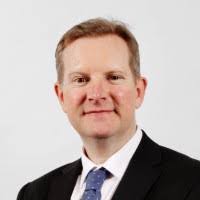 Tom Holbrow is the Business Development Director at Mace Group. He is a senior Board level professional with expertise in Engineering and Construction Business Development. He leads the Business Development function for the Public Estates, Research, Education, Arts and Culture and Healthcare Construction team at MACE.
Tom Holbrow is the Business Development Director at Mace Group. He is a senior Board level professional with expertise in Engineering and Construction Business Development. He leads the Business Development function for the Public Estates, Research, Education, Arts and Culture and Healthcare Construction team at MACE.
Mace is a global expert in shaping the built environment – helping to lead the way to a more connected, resilient and sustainable world.
From estate rationalisation and transformation programmes to construction and fit out of new and existing offices, MACE uses its skills and knowledge to help the UK government achieve significant cost savings.
…“So understanding how other organisations are dealing with that as well, without losing sight of the sustainability, Net Zero carbon and the ESG agenda.”
Our next guest touches on one of the most important things right now when it comes to achieving our goals around NetZero…collaboration
Katie Clemence-Jackson, MENG CENG MCIBSE, Senior Engineer & Partner, Max Fordham
Katie is a senior project engineer and sustainability consultant, experienced in delivering varied and unique projects at all construction stages. She is chartered with CIBSE and actively involved in the Institution, including chairing the CIBSE Technology Committee.
 Katie coordinates the activities of Max Fordham’s Net Zero Carbon (NZC) working group, and was key to establishing the Practice’s NZC design service. She is also co-chair of the Practice’s Equality, Diversity and Inclusion group. Plus she was an NLA Expert Panellist for Net Zero Alumni 2021.
Katie coordinates the activities of Max Fordham’s Net Zero Carbon (NZC) working group, and was key to establishing the Practice’s NZC design service. She is also co-chair of the Practice’s Equality, Diversity and Inclusion group. Plus she was an NLA Expert Panellist for Net Zero Alumni 2021.
In her day to day work, Katie likes to think of services engineering as bringing a building to life. She starts with an empty shell and turns it into a living, breathing place where people feel comfortable.
Katie create designs that go beyond their intrinsic functions, considering how each system will be installed, maintained, tested and understood by the end users.
One of the most rewarding aspects of her job is building relationships with the design team and clients so that she can help turn their abstract ideas into an elegant design. Once she has understood their vision, motivation and goals, Katie can design the engineering services to support and enhance this vision in a way that is implicitly understood by the end users.
And I think what we’ve learned from a lot of the talks happening today and happening yesterday and untold conferences, the the value of collaboration and communication.
Timothy E. Glew, Business Development Manager, Q-Bot talks about robots, and specifically Betty
 Q-Bot featured on BBC Breakfast following the announcement of the UK’s Energy Security Strategy
Q-Bot featured on BBC Breakfast following the announcement of the UK’s Energy Security Strategy
Along with 25 robots, Q-Bot employs 35 humans at a headquarters in London and offices in Newcastle. The highly-experienced multidisciplinary engineering and research team has a unique blend of robotics, digital and building experience.
Q-Bot was founded in 2012 by Tom Lipinski and Professor Peter Childs, whose entrepreneurial track record includes the commercialisation of innovative technologies as well as previous successful exits.
…”So we create a hole in the floor that fits our robot, Betty inside, once Betty is inside, she deploys a foam to the underside of the floor, which I’m actually showing you now.”
Next Pete the Builder talks to Ian Waddingham, Director and Founder at QED Structures and his colleague, Myda Carolan.
 Ian formed QED Structures in December 2005. Today this structural and civil engineering firm has offices in Hove, London and Barcelona.
Ian formed QED Structures in December 2005. Today this structural and civil engineering firm has offices in Hove, London and Barcelona.
QED Structures work a lot in all different types of sectors, from housing to retail, commercial, sports and leisure health care. We do a lot of modular buildings in light gauge steel.
QED Structures is a modern innovative design-based consultancy who believes in providing a personal and holistic approach to projects.
They are a forward thinking and practical practice who like to get involved at the very initial concept or site acquisition stage to help architects and developers expand their ideas whilst also advising on the most suitable form of construction.
“…I think in the UK, you can definitely see a massive push for sustainability. In events like this, you know, it’s constantly being at the forefront of all the designs that we’re doing.”
Myda Carolan also from QED Structures …
And it’s super important that we all continue to push that and we all share our experiences and our knowledge, just so we can make sure that we’re all achieving that together.
This first FOOTPRINT+ Special ends on a height with Richard Halsey
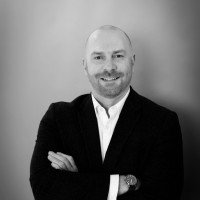 Listen to Richard Halsey who presented two sessions at FOOTPRINT+ – Energy Systems Catapult, Local Area Energy Planning and Zero-Carbon Communities: Unlocking Potential
Listen to Richard Halsey who presented two sessions at FOOTPRINT+ – Energy Systems Catapult, Local Area Energy Planning and Zero-Carbon Communities: Unlocking Potential
Richard leads a multi-disciplinary team at Catapult Energy Systems specialising in supporting innovation and transformational change across the energy system.
Richard joined the Catapult team in 2015 and has led Catapult’s delivery of the national Smart Systems and Heat programme and leads on the delivery of complex clean energy projects and programmes for the public and private sector.
Richard specialises in low carbon and energy system transformation, innovation, techno-economic analysis, planning, sustainable development, and climate change.
I think understanding what the consumer of today and the consumer of the future in terms of house, house buyers, house renters are going to want from their homes, is going to be really important, I think, having the ability to understand the solutions that might be most appropriate in different areas and having the ability to design flexible solutions that are able to respond to different needs in different places, but also to different customer segments is really important.



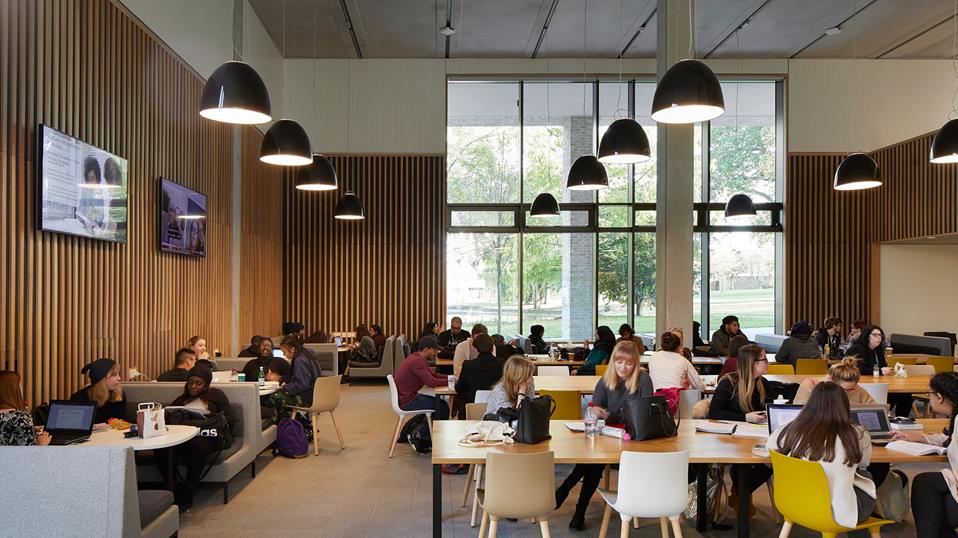


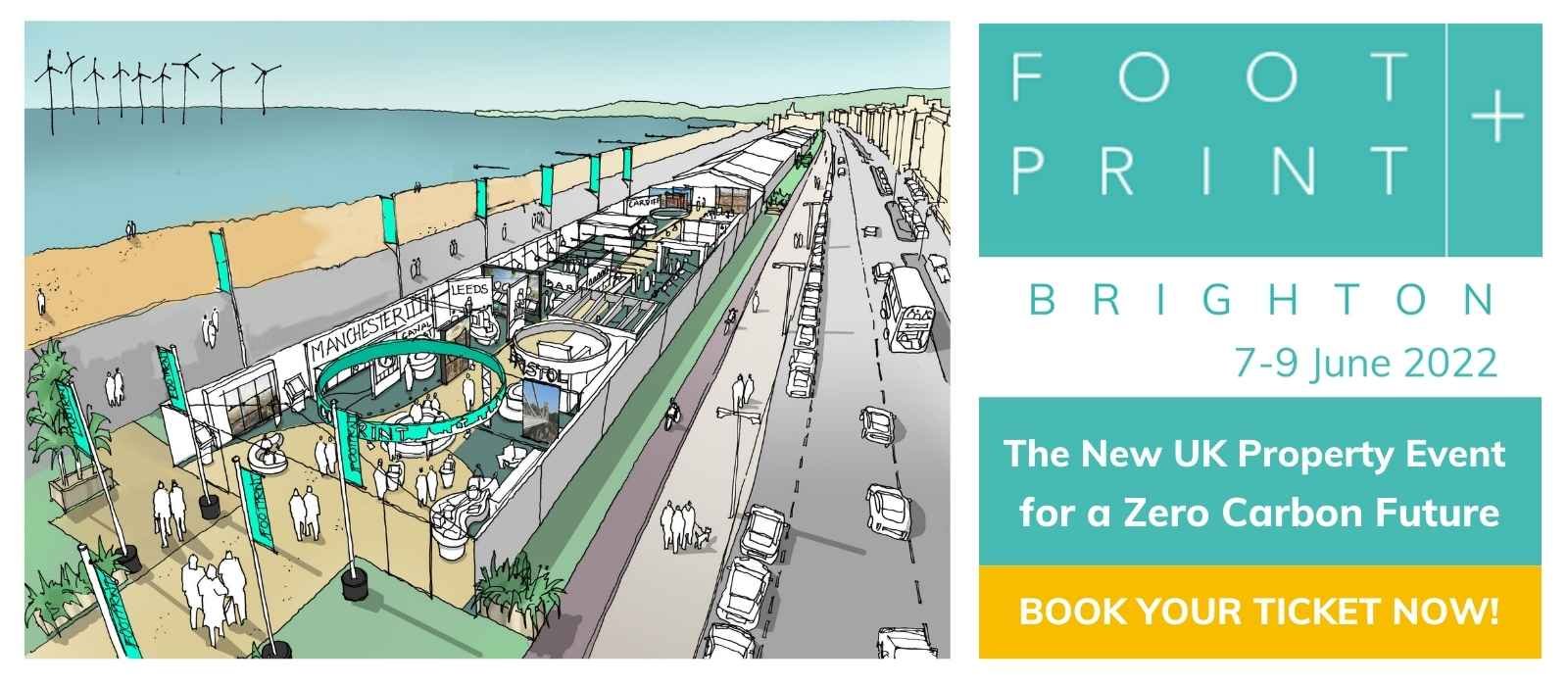
Episode 39: Footprint+ bonus special 2 with interviews from the event - Constructive Voices Radio & Podcast
3 years ago[…] you missed any interviews from the event you can catch up on previous specials one, two, three and four. Plus the first bonus special is available […]
Episode 37: Footprint+ bonus special 1 with interviews from the event - Constructive Voices Radio & Podcast
3 years ago[…] you missed any interviews from the event you can catch up on previous specials one, two, three and […]